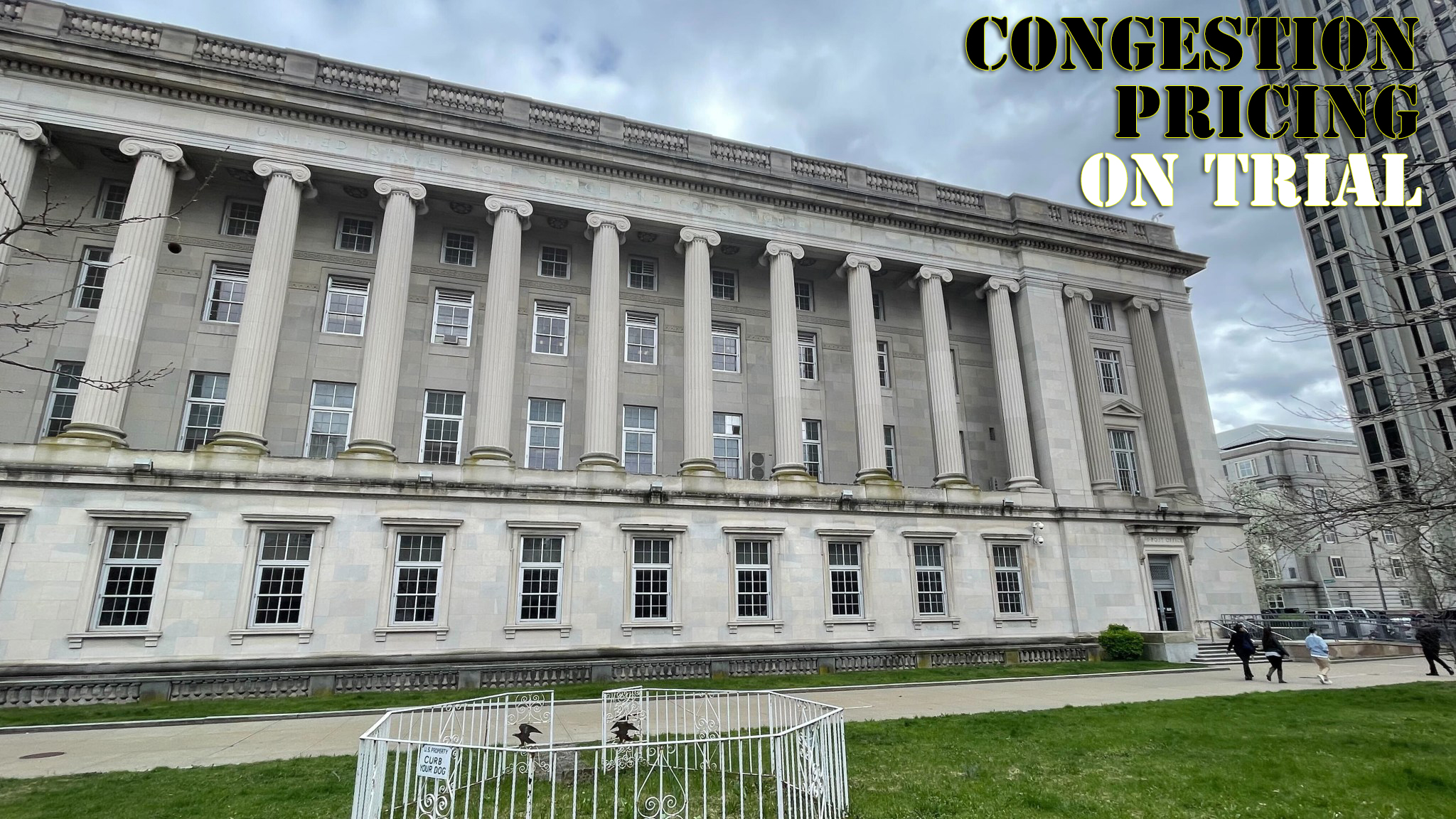A day after a federal attorney was left grasping for answers in front of the judge hearing a challenge to the congestion pricing environmental assessment, an attorney for New Jersey got his own a taste of the judicial lash on Thursday.
On Thursday, the Garden State's attorney in the suit, Randy Mastro, pressed his case that the Federal Highway Administration acted in an arbitrary and capricious manner in determining exactly which New Jersey communities were eligible for so-called "place-based" mitigations due to their potential for absorbing impacts from shifting traffic patterns due to the toll.
But Mastro may have pressed too hard — and inadvertently exposed the holes in New Jersey's suit when he failed to cite any specific provision in the National Environmental Policy Act to bolster that argument.
New Jersey's legal case against congestion pricing hinges in part on the assertion that the MTA has failed to mitigate potential adverse environmental impacts to all impacted Garden State communities. Specifically, Mastro pointed to the fact that the FHWA winnowed down the New Jersey communities eligible for mitigation efforts from 15 communities to four that were mentioned in the EA.
Making his case in Newark before federal Judge Leo Gordon, Mastro claimed that "the obligation of NEPA is to mitigate everywhere you find impacts."
"Where in NEPA does it say you can ... narrow things down?" Mastro asked. "Nowhere does it say you can make gradations or distinctions."
Gordon, who has repeatedly asked attorneys for both sides to back up their arguments with specific evidence from the law, then asked whether NEPA has an "affirmative prohibition" that backs up Mastro's claim.
"That is what I believe the regulations require," a stumped Mastro responded — failing to satisfy the judge's concern.
"Where does it prohibit the FHWA from making gradations?" Gordon asked. "Either they have the authority to do what they did or they didn't. Do they not have the authority to do that, or do they have the authority to do it and did not explain it reasonably?"
New Jersey's suit hinges on its claim that the MTA's 4,000-page environmental assessment of the tolling program failed to take a NEPA-required "hard look" at environmental impacts on the Garden State. One aspect of that claim is that the MTA should have proposed specific mitigation efforts for New Jersey communities where the analysis found potential for environmental impacts.
MTA officials have said New Jersey could be in line for place-based mitigation funding, but have so far only announced such efforts for New York communities. This is in part because New Jersey environmental justice groups did not request any such mitigations during the environmental review process, MTA lawyers argued in court on Wednesday.
Mastro's moments under the judicial microscope were a mirror image of Wednesday's hearing, in which Greg Cumming, a lawyer for the FHWA, initially struggled to explain how it came to be that the Bronx had some specific mitigation projects that would be funded by the MTA and New Jersey did not.
Amy Turner, the director of the Cities Climate Law Initiative and research scholar at Columbia Law School's Sabin Center for Climate Change Law, has called New Jersey's focus on the alleged shortcomings in the mitigation efforts "weak."
"Any mitigation that's being offered through congestion pricing from the perspective of NEPA is nice to have. So it does not matter that New Jersey claims it's not receiving sufficient mitigation from the project. That's not a NEPA question," Turner told Streetsblog last year. "That's a political question as between New York and New Jersey."
Elizabeth Knauer, a lawyer for the MTA, mentioned Wednesday and again on Thursday that New Jersey will also benefit from "regional" mitigations that will keep trucks from driving around lower Manhattan to avoid the toll, such as a lower overnight toll and new funding for the New York City's off-hours freight delivery program, which incentivizes overnight deliveries.
Where each hard moment for the attorneys leaves the fate of congestion pricing is hard to tell. In his closing arguments, Mastro again emphasized the claim from New Jersey that any and all impacted communities needed some kind of specific commitment to mitigation. On the other hand, MTA attorney Mark Chertok said that Mastro and the Garden State's case relied on "chery-picked" case law and EA citations that didn't pass legal muster but did provide "political expediency" to the case.
For his own part, Gordon emphasized in his closing statement that no one should read anything into the way he interrogated lawyers for each side. Allowing that some of his questioning or rapport with attorneys "maybe have seemed harsh," the judge essentially suggested he was using the philosophy that iron sharpens iron.
"Conversation spotlights important issues and helps people to understand issues," Gordon said by way of explaining how he was using his back-and-forths to educate himself on the issues in front of him.
New Yorkers and New Jerseyans will be waiting a number of weeks to see what the fruit of those conversations is. Gordon said he and his legal assistants are aware of the MTA's goal of starting congestion pricing on or around June 15 this year, but couldn't give an exact date for when he would rule on the motions for summary judgment.
"I can’t tell you if that’s May 1, May 15, May 30, June 1, or June 10," said Gordon.






